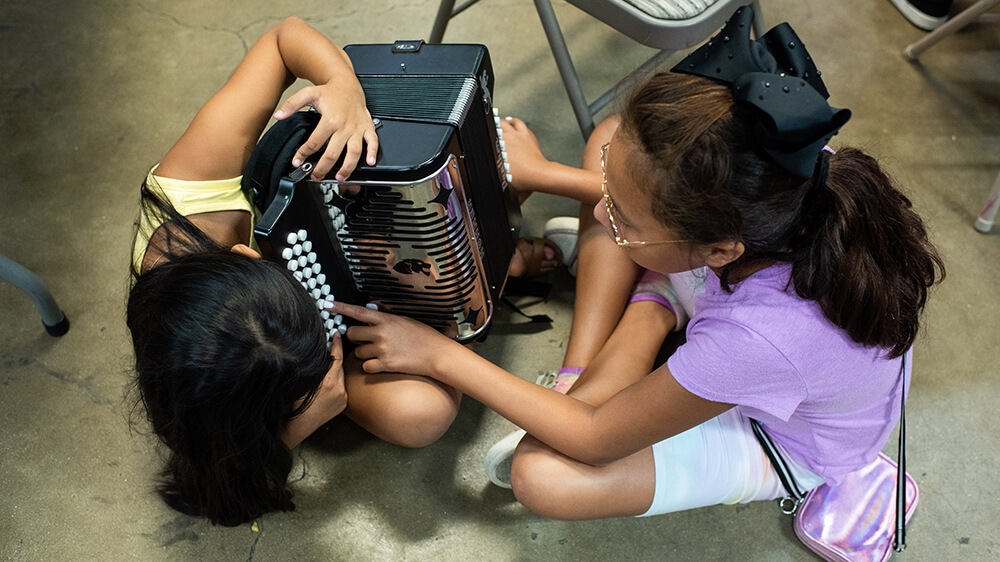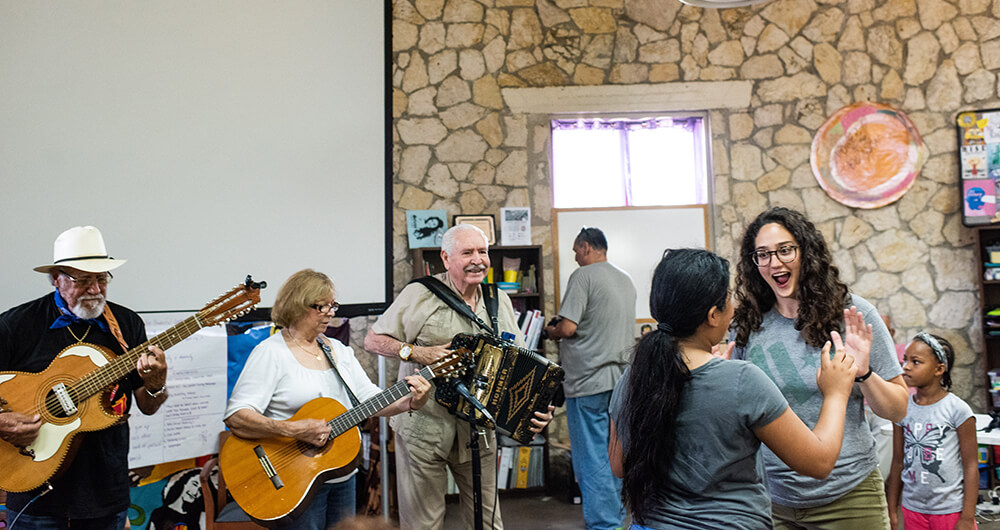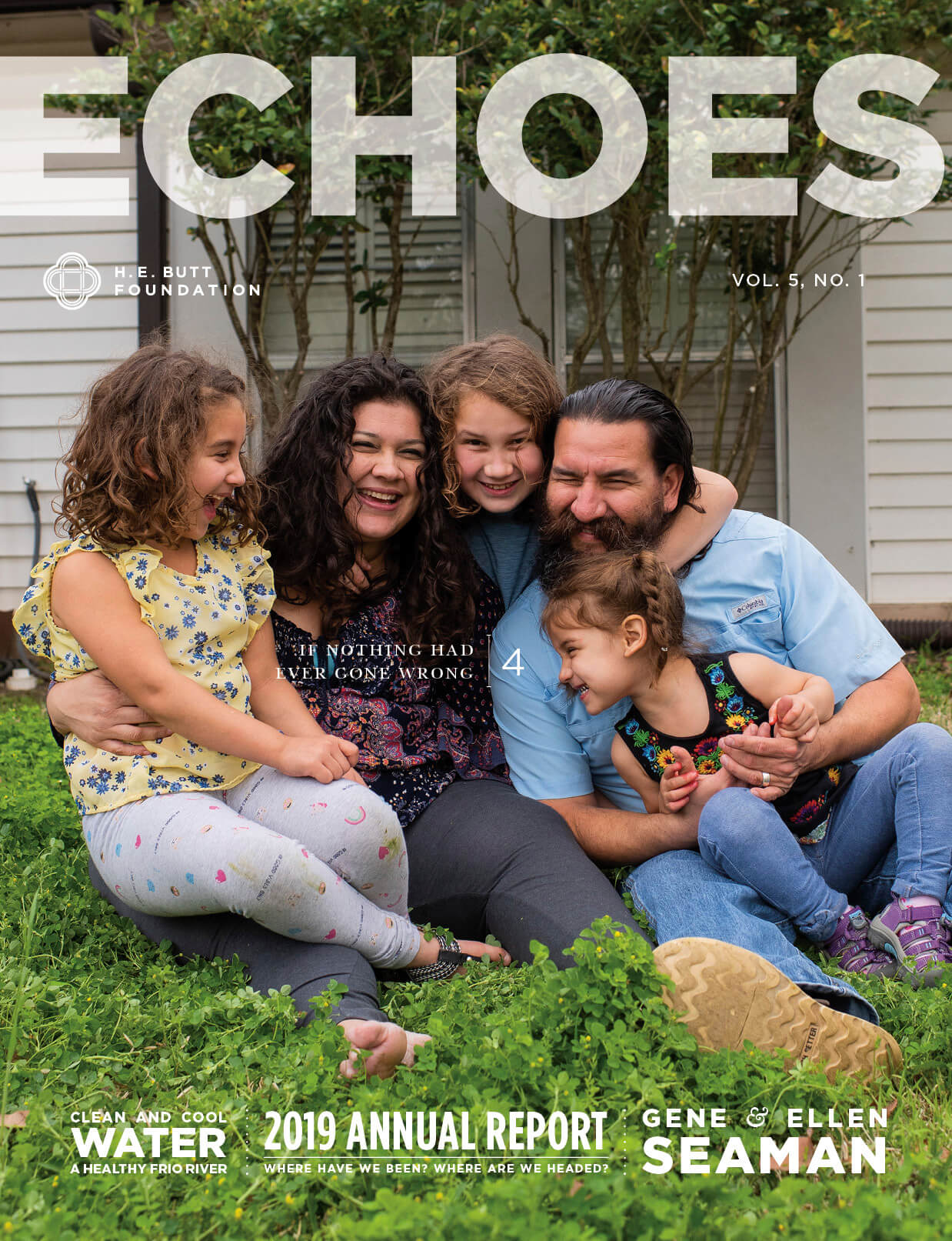

Girl Zone Camp Introduces San Antonio Girls to Community Accountability Via Conjunto Heritage
Annabelle, a fifth grader, is dancing with her college-aged camp counselor on a Monday morning in the old limestone building of Martinez Street Women’s Center in Dignowity Hill, a neighborhood just east of downtown San Antonio. The girl’s vibrant personality matches her bright orange shirt and purple glasses—it is no surprise that she is the first girl to start dancing.
Nearly 65 people stand in a circle around them, and, because it is the counselor’s birthday, they are singing the traditional Mexican birthday song “Las Mañanitas”: “Despierta, mi bien, despierta, mira que ya amaneció…” “Wake up, my love, wake up. Look at what has dawned…”
This is Girl Zone, the Martinez Street Women’s Center’s summer camp program that dares girls to be powerful.
Today, girl power looks like dancing, glazed birthday donuts, and singing along with performers from the Conjunto Heritage Taller, a San Antonio organization that has been teaching conjunto music to the campers for several weeks. Mexican conjunto, or conjunto tejano is a blend of Mexican and German music that dates to the late 1800s. Today’s set features Rudolfo Lopez on baja sexto, a 12 string bass guitar, and Bene Medina on the button accordion.
Pretty soon everyone is joining in the celebration, because these guys can play. They’ve got chops. Medina is an inductee in the Tejano Conjunto Hall of Fame.
After the dance, they settle into the day’s camp activity—accordion lessons.
“Accordion is cool,” Annabelle tells me afterward. “Me and my mom got my stepdad one for his birthday.” This is her third year at the Girl Zone summer camp.
“It’s fun,” she says. “I get to hang out with a bunch of girls all day instead of staying at home.”
That sounds just right to Victoria Ramirez, Girl Zone Manager for the Martinez Street Women’s Center. We connected with her after they spent several days at Wind Song last May with the H. E. Butt Foundation Camp. It was their fourth visit to the Frio Canyon property.

According to their website, the Martinez Street Women’s Center is “transforming communities through women and girls”—a mission statement that harmonizes well with the mission of the H. E. Butt Foundation where we are “cultivating wholeness in children and families for the transformation of communities.”
For Victoria and her campers, community transformation begins with the youth leaders themselves—especially the high school aged junior counselors. She wants them to be active participants in the work, partners in their own transformation rather than objects being transformed by outside forces.
“Youth as partners vs. youth as objects,” she explains. “We have been focusing on the youth voice and what they want to see in their community.”
If that response seems a little disconnected from the accordion workshop, Victoria is happy to explain more. Around us, the circle of girls has divided up into smaller circles, a circle of circles, each gathered around an accordion teacher.
Victoria says, “Every day we start our class in circles. They are sacred, the space is honorable, safe, and healing.”
By circles, she means literal circles. Elementary girls, high school youth leaders, college counselors, and mentors like Lopez and Medina sitting or standing or dancing in circles. Victoria says this simple community shape invites campers to be partners in the camp experience rather than objects that camp can teach or fix or manipulate. The community’s structure and habits give the girls space to explore who they are in themselves and in relationship to others.
“We have circles that hold true to restorative teaching practices rather than punitive teaching practices as youth are coming into their own identities,” Victoria says.
“We are excited to learn how we can implement community accountability and community based organization.”
Victoria Ramirez
The program teaches the girls a new way of being together and supporting each other as they navigate a system that can feel like it has been designed to make them fail: concentrated poverty, food insecurity, racial segregation, schools that don’t receive infusions of resources from their community, teachers overwhelmed by the needs of their students. The neighborhood’s Brackenridge High School, with 98 percent minority enrollment, is almost fully segregated, and ninety percent of the students there qualify for free lunch.
For the high school leaders at Girl Zone, this means they are juggling part time jobs on top of everything else.
“A lot of them are working and helping out their families,” Victoria says.
Facing so much injustice requires a special kind of resilience to avoid becoming bitter or resentful, so the accordion lessons will soon give way to discussions in which staff model the principles of transformative justice.
“Transformative justice is a new concept to us,” explains Victoria, “and we are excited to learn how we can implement community accountability and community based organization.”
For those unfamiliar with the idea, transformative justice aims to address root causes rather than individual injustices. While charities like food banks and homeless shelters provide important short term assistance, transformative justice hopes to improve society by working on the social conditions that lead to injustice in the first place. For San Antonio, this means addressing inequity experienced by a community like Dignowity.
These are big ideas to throw at fifth graders during summer camp, so Victoria takes a relational approach, teaching the girls to love each other, love others, and ultimately develop enough self-confidence to love themselves.
“You grow, like, a family bond around here,” explains Jala, one of the high school mentors. “It’s like a sisterhood.”
“Girl power,” agrees Linda, a camp counselor who has been with the program for 12 years. Linda is now working toward a nursing degree at the University of the Incarnate Word.
Results like this are why the Martinez Street Women’s Center was invited to participate in one of the H. E. Butt Foundation’s first capacity-building cohorts. The foundation aims to support transformational work in organizations all across San Antonio.
Annabelle has a few years before she graduates from camper to Girl Zone mentor, but it is clear that she, too, is finding her voice, learning what it means to be accountable to her community, and maybe even growing into an agent of transformative justice.
Just after she finishes this accordion lesson.
“You grow, like, a family bond around here.
It’s like a sisterhood.”
